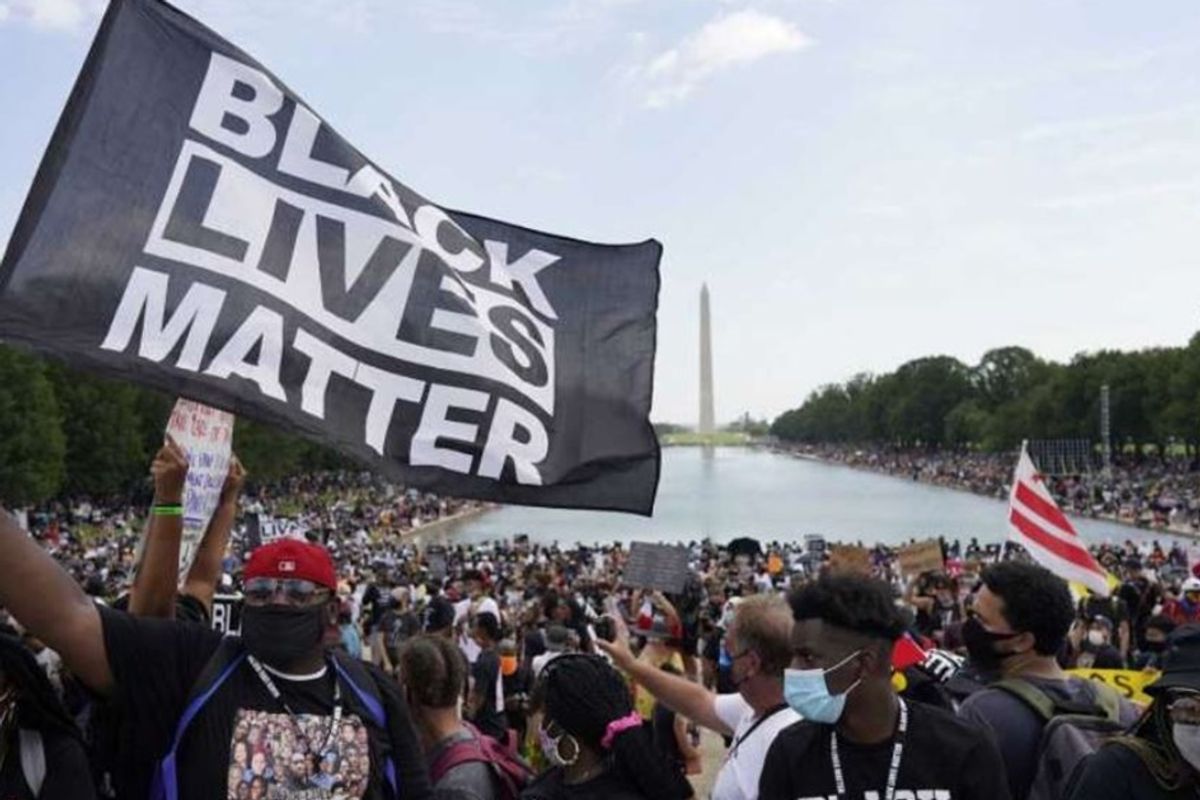Thousands gather to honor 57th anniversary of King's March on Washington and renew calls for equality

Fifty-seven years after Martin Luther King Jr.'s "I Have a Dream" speech at the Lincoln Memorial for the 1963 March on Washington for Jobs and Freedom, thousands of people returned to the same location for the Commitment March: Get Your Knee Off Our Necks.
The day's events took on added importance after an officer from the Kenosha, Wisconsin Police Department shot Jacob Blake on Sunday, sparking protests throughout the country.
The event featured speeches from the family members of George Floyd, Breonna Taylor, Eric Garner, and Blake as well as keynote addresses from Reverend Al Sharpton and Martin Luther King III.
The event was organized by the National Action Network as a call for police reform and racial justice. Lines for the event extended for several blocks as organizers took temperature checks for all attendees to mitigate the spread of the COVID-19 virus.
COVID ENTRANCE PROCEDURE FOR THE MARCH ON WASHINGTON 🙌🏾🙌🏾🙌🏾 TEMPERATURE CHECKS ✅ WRISTBANDS ✅ HAND SANITIZER ✅… https://t.co/MInBdQMrAW— tiffani 🏝🍯 (@tiffani 🏝🍯) 1598618340.0
"We've come to bear witness, to remain awake, to remember from where we've come and to carefully consider where we're going," King said according to the Associated Press. "Whether you're here in person or watching on (television networks), thank you for joining us for this March on Washington."
"We're taking a step forward on America's rocky but righteous journey toward justice," he added.
"We didn't just come out here to have a show," Sharpton said. "Demonstration without legislation will not lead to change."
The late Democratic representative John Lewis, who passed away earlier this month was referenced several times during the event. Sharpton paid homage to Lewis' call for people to get into "good trouble" to fight injustice, saying, ""we didn't come to start trouble, we came to stop trouble."
"Black lives matter," Sharpton said. "And we won't stop until it matters to everybody."
Rev. Al Sharpton explains why we still have to say 'Black Lives Matter' https://t.co/npSGTT3QPV— NowThis (@NowThis) 1598635582.0
Democratic Vice Presidential candidate Kamala Harris sent over a taped message to the event.
She said that if Civil Rights leaders from the '60s march were in attendance today they would, "share in our anger and frustration as we continue to see Black men and women slain in our streets and left behind by an economy and justice system that have too often denied Black folks our dignity and rights."
"They would share our anger and pain, but no doubt they would turn it into fuel," Harris continued. "They would be lacing up their shoes, locking arms and continuing right alongside us to continue in this ongoing fight for justice."
One of the emotional high-points of the event was a speech by George Floyd's brother, Philonise Floyd, who said he wished "George were here to see this right now." His sister, Bridgett Floyd, said, "we have to be the change."
George Floyd's brother, Philonise Floyd, spoke at the #MarchOnWashington demanding racial equality. Watch the full… https://t.co/vkzQIknGlR— Aroguden (@Aroguden) 1598644036.0
Trayvon Martin's mother, Sybrina Fulton, shared words of encouragement with the audience. "Even though we're going through a crisis, even though it looks dark, I want to tell you to be encouraged," Fulton said. "Don't stop saying Black lives matter, don't stop protesting."
Later in the evening, the Movement for Black Lives, a group of over 150 organizations that make up the Black Lives Matter movement, will hold a virtual Black National Convention.
The convention will unveil a platform to enact laws inspired by the central themes of this summer's protests, investments to education, healthcare, housing, and social services as well as police reform.
- 27 celebrities who proudly marched with fellow activists in the ... ›
- Too young to remember the huge LGBTQ rally of 1993? Check out ... ›
- Mitt Romney took part in Black Lives Matter march on the White House ›





 Courtesy of Kerry Hyde
Courtesy of Kerry Hyde Courtesy of Kerry Hyde
Courtesy of Kerry Hyde Courtesy of Kerry Hyde
Courtesy of Kerry Hyde Courtesy of Kerry Hyde
Courtesy of Kerry Hyde Lady Liberty welcomes people to New York.
Lady Liberty welcomes people to New York. French abolitionist Édouard René de Laboulaye, who commissioned the Statue of Liberty.
French abolitionist Édouard René de Laboulaye, who commissioned the Statue of Liberty.
 Photo by
Photo by 
 Ladies having a girls' night
Ladies having a girls' night A woman showing off her engagement ring
A woman showing off her engagement ring Beauty Baby GIF by Aksan Kozmetik
Beauty Baby GIF by Aksan Kozmetik Screaming Oh God GIF by Film Riot
Screaming Oh God GIF by Film Riot